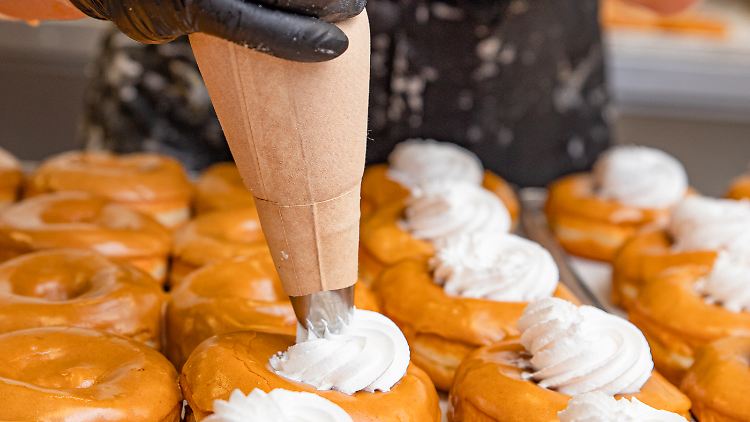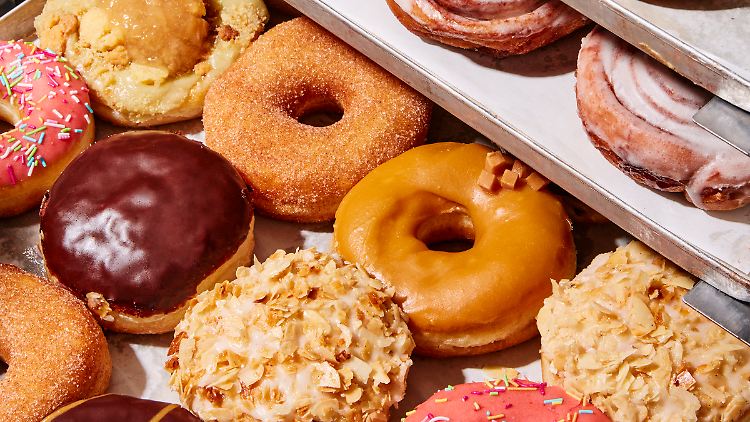The startup Brammibal’s produces a special version of the globally popular lard kringel: the donuts are vegan. The success shows how veganism is trending on the food market. The founders are already making new expansion plans.
Cinnamon Sugar, Strawberry Pretzel, Boston Cream, Mozartkugel or Bienenstich: These are the names of the round, colorful, sweet and, above all, vegan creations from the Berlin donut startup Brammibal’s. Its sweet curls have been delighting not only vegans for almost ten years. The vegan donut business seems to be worth it: in 2021, the chain’s profit was almost 700,000 euros. It’s loud Federal Statistical Office Only one in three new start-ups in the catering industry are still active after five years. With vegan donuts, Brammibal’s is apparently relying on a recipe for success.
And this has been going on since 2015: The Berlin nurse Jessica Jeworutzki has been dissatisfied with her work in nursing for a long time. As a teenager, the Recklinghausen native decided on a vegan diet. Because her vegan donuts are well received at private parties, she makes a decision: she wants to turn her passion into a career.
Handcrafted to success
Together with her partner Bram van Montfort, who was still an IT student at the time, she began selling vegan donuts at Berlin markets. From the beginning, demand was so high that they sold out quickly every time. “It happened that people cried when we ran out of donuts,” says the founder in an interview with ntv.de. That’s why the couple decides to open a small neighborhood café on Maybachufer in the trendy “Kreuzkölln” district.

The Brammibal’s founders attach great importance to manual work in the production of the vegan donuts.
(Photo: Brammibal’s Donuts)
When a crowdfunding campaign doesn’t bring in enough start-up capital, friends and family give them the crucial injection of funding. Not only in the bakery, but everywhere in the shop they rely on handwork. In the shop, they lay the tiles themselves. “You can still see how crooked they are,” says Jeworutzki. And that’s not the only problem: the Berliner Wasserbetriebe is demanding a grease separator, the Chamber of Crafts is demanding a trained master confectioner. “We were threatened with closure,” says Jeworutzki. The founders work up to 80 hours a week to realize their dream. The store can open in 2016.
Veganism in the mainstream: “Label for good”
Vegans are still a small minority among Germany’s 84.6 million inhabitants: According to one Analysis by the Allensbach Institute for Demoscopy 1.52 million Germans eat a vegan diet. This means that only 1.8 percent of the total population describe themselves as vegan. The target group seems small, but experts predict rapid sales growth in this market: one current report from the market research company Businessresearch Company The vegan food market is expected to grow from $24.58 billion in 2023 to $27.8 billion this year. One reason for this is increasing concern about the impact of factory farming on the environment. By 2028, the market is expected to grow to $42.86 billion.
“Veganism creates an ideal type of how we want to act in the world today, namely as responsible people who, as consumers, treat people, animals and the environment sensitively,” says brand sociologist Oliver Errichiello in an interview with ntv.de. He explains the arrival of the “vegan” label on German supermarket shelves with the so-called “halo effect”. “When I claim something for myself that is positively charged, exactly this positive spirit radiates off to me. Even if I perhaps only live it out in a situational way.” Vegan donuts don’t just appeal to vegan customers. “Around ten percent of our customers eat a strictly vegan diet,” reports Jeworutzki from a customer survey.
Big brands have also jumped on the trend. “That’s why we can no longer save ourselves from vegan labels, even though they are sometimes completely absurd,” says Errichiello. “For example, when a water presents itself as vegan because you know exactly the power of this symbol as a label for good.” This appeal is particularly true for confectionery at the moment: one Survey by the US market research company NielsenIQ According to this, vegan sweets generated 1.09 billion euros in sales in Germany last year achieved – a third more than last year.
Clear conscience despite snacking


Brammibal’s founders Bram van Montfort and Jessica Jeworutzki opened their first store in 2016.
(Photo: Brammibal’s Donuts)
The Brammibal’s founders don’t believe it’s unhealthy to eat a vegan donut every now and then. “If someone only eats donuts, it might not be so healthy,” says founder van Montfort, who discovered the vegan lifestyle in his twenties. “I don’t think vegan donuts are classic fast food – even if you can eat them pretty quickly.” The manufacturing process is more in line with slow food, he explains. Many customers don’t know how much work goes into it. “It takes six hours of work, from the time the dough is made in the bakery to the delivery to the store.”
According to Errichiello, Brammibal’s creates a “miracle structure” with an “actually deeply sugary product.” These are things that don’t actually fit together in our life experience. “Even if I know that the product actually has too much sugar, I can still say that I’m doing something good. If I eat 500 calories, it makes my personal guilty conscience a little easier if I have the impression that I actually do I eat to preserve ecological diversity.”
Sustainability is part of the Brammibal’s concept. According to their own information, the founders commissioned a carbon footprint in 2022. The entire supply chain, right down to the gas for flour production, is being questioned. They filter frying fat to reduce demand. They also make sure to source regional products wherever possible. They reject frozen products or ready-made dough blanks.
Big plans for the future: Berlin, Hamburg, Amsterdam?
The first store opened in Hamburg-Altona in 2022. Branches in the Schanzenviertel, Jungfernstieg and the main train station followed within a few months – “without the help of investors,” as the founders emphasize. However, the financial year was difficult. The price increases as a result of inflation, the crisis in the catering industry, reduced margins and the construction of the new location presented them with challenges. It was not possible to do more than cover costs because of the high investment costs.


Brammibal’s donuts don’t just appeal to vegans. According to a customer survey, only around ten percent of their customers eat a vegan diet.
(Photo: Brammibal’s Donuts)
Further expansion should now help. The opening of new branches is planned for spring. Over and beyond The founders can imagine opening branches in the future in major cities such as Cologne or Munich or in van Montfort’s home country, the Netherlands. “Our business only works with several branches in one location,” he explains. “We have to bake fresh dough every day, up to 10,000 donuts a day in Berlin. For this we need our own bakery. For a single branch in a small town, the effort wouldn’t be worth it.” Brand sociologist Errichiello also says: “The concept probably wouldn’t work in a small village. The point is that Brammibal’s stays exactly in these milieus between cargo bikes and old apartments – to use the clichés.”
The founders sought professional help for the expansion: an ex-Starbucks manager. When asked whether they want to become the next Starbucks, they answer in the affirmative. “We were the first vegan donut shop in Europe,” reports Jeworutzki. “There is still something missing in the market and we want to fill that gap.”
However, Errichiello warns against too much growth: “The key to success is limitation, because we always connote smallness with authenticity. In the short term, expanding such a concept will always work, but in the long term it usually doesn’t.” There is a lot of passion and conviction in many vegan manufacturers, especially at the local level. “Big companies like to take advantage of this – they benefit from the persuasive power of the smaller ones, like Ben and Jerry’s, which was once a small ice cream parlor. Or Ankerkraut, whose sudden sale to a multinational caused a huge storm of indignation.”
The Brammibal’s founders don’t just want to grow with new branches. They regularly try to expand their range to include hearty vegan products through time-limited special offers. There were pizza donuts for “World Pizza Day” on Friday.
